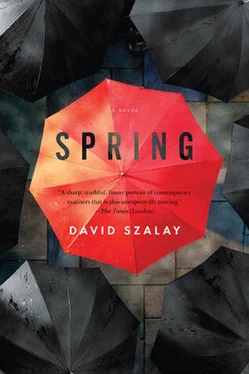Of course! James thinks.
That tall man with the long pale face and the grey-blue eyes—not unlike James himself, in fact—had looked ominously familiar. He knew he had met him somewhere. The green tweed suit had thrown him. And Tristan was older now… It was suddenly all there. Tristan Elphinstone. He had worked for Lazard in those days, and Lazard was involved, with various others, in the floatation of Interspex. He and James had seen quite a lot of each other for a few months. Lunches, meetings in the offices near Moorgate, taxis. (In the taxis there was a strict etiquette, Tristan always sitting on James’s left, facing the direction of travel, with their suited flunkies perched on the flip-seats opposite.) Lazard had invited him to Wimbledon that summer, the Men’s Final—it was the last year that Sampras won. Tristan was host that day. They even went to New York together, had suites on the same floor of the Plaza. The next morning, the presentation on the umpteenth floor, with the snow swirling outside… Tristan Elphinstone. Wife an Italian aristocrat. Stunning, elegant, sexy. What was her name? Dorabella? Fiordiligi? James met her that Sunday in SW19…
‘Tristan,’ he says. ‘How are you, mate?’
Tristan laughs confidentially and leans closer to James (who is able to smell the Acqua di Parma emanating subtly from his tweed suit) to lower his voice and say, ‘I’m not doing too well this afternoon, actually. What about you?’
‘Me? I’m doing okay…’
‘Had a winner?’
‘Had the first two.’
‘Fucking bastard,’ Tristan says, still laughing quietly. ‘Typical. What are you on in the next? I’ll make sure I am too.’
‘Forget The Past.’
‘Nice one.’
Tristan is, of course, too tactful to ask James what he is ‘up to now’ or anything like that. He knows, obviously, that Interspex is no longer trading (not that it was ever exactly trading )—Lazard had filed a suit for several million pounds in unpaid fees. That was the liquidators’ problem, though. James had nothing to do with that.
There is a lot of talk about who is on what in the main event, most of it about Trevor’s £20,000 on War Of Attrition, a fifteen-to-two shot owned by Michael O’Leary, the Ryanair magnate. The prospect of a £150,000 win has made Trevor pensive, and he just loiters there in the tumultuous sea of people, with his hands in the pockets of his mac.
When War Of Attrition wins, he hurls the Racing Post he is holding into the sky and lets out a long wordless yell that makes the veins on his neck and temples leap out.
*
The apple blossom was out in Victoria Road. The tarmac shone in the unseasonable April sun. For the first time, he had the top down on the Aston. Pure pleasure, to slip through the streets of Knightsbridge and South Kensington with the top down and the washed air swirling and surging in his face, fresh and vigorous as springwater. His skin tingled. His heart tingled. Passing under the lofty young-leafed trees, he saw people on horseback in the park, trotting through the patchwork of the shade.
That morning he had met with Tristan Elphinstone at Lazard. Tristan had told him that everything was okay. He was a nice fellow, Tristan. And sharp too, very sharp. James had been passing through Moorgate anyway, so had suggested popping in for a quick meeting. ‘Always happy to see you,’ Tristan had said. James was passing through Moorgate because he had been out in Mudchute inspecting the new servers. Five hundred thousand pounds’ worth of servers had just been installed in the old warehouse there. Enough to cope with the next twelve to eighteen months of expansion. Then they would need more—the Mudchute installation was just a temporary measure. They were already looking for a much larger space, or rather the site for one. The idea was to build something the size of an airport hangar somewhere on the periphery of London. He was to look at one such site this afternoon. So he inspected the Mudchute servers—and even they were impressive, with their team of technicians and wall of loud ventilators, over which the head technician had had to shout to tell him that everything was okay—and when he had done that, he stopped off in Canary Wharf to have a word with Karl Meisner at Morgan Stanley. Everything was fine, Karl said. They were having no problems placing the shares. They had provisionally placed the first tranche already. They were ahead of schedule. Karl had wanted to take him to lunch but James said he didn’t have time, which he didn’t. In those days he never had time.
As he slipped through the lanes of Wapping, he phoned the office in Paddington to make sure everything was okay. He loved the office in Paddington. Everything was new there. The shining light-filled offices themselves were startlingly new, sprouting out of dereliction, out of a sad, forgotten, Victorian hinterland. He was proud to be in the vanguard of the new economy—and he was in the vanguard; there were even jungle drums suggesting that he might be invited to one of those parties at Number Ten, the ones where the Prime Minister mingled with envoys of the young and the new. They were the first tenants in the Paddington development, and the offices were still only half-furnished. Trucks full of stuff pulled up outside every day. His own office was still empty except for some essential furniture, a phone, and a specially made neon sign—in the style of Tracey Emin—saying ‘Get Large Or Get Lost’. The lack of seats meant that meetings had to take place with everyone standing up. This worked so well, in terms of keeping everything quick and to the point, that he had decided to institutionalise it. Serendipitous. He was usually in by eight in jeans and open-necked shirt. They had taken two floors, though for the time being they only needed one. Not even one. Even so, within twelve to eighteen months they would probably have to take more. They were hiring people every day.
So he stopped in Moorgate to see Tristan, who ushered him into the plushest meeting room on the premises and told him that everything was fine. Yes, the markets had lurched lower in March, it was true. However, they were now heading strongly north again. Such things were to be expected… Sitting there in his charcoal suit—there was something otherworldly about the quality of the tailoring—Tristan had the softly unshakeable manner of a very expensive doctor, telling you that while he understood what was worrying you, and was pleased that you had mentioned it, you were in fact perfectly fine. The trip to New York in February had been a fantastic success; there was lots of interest from the American institutional investors who had been at the presentation. He said, with his usual winning smile, that he was now looking forward to their forthcoming trip to Frankfurt and Zurich to make similar presentations, and would look into organising something in Singapore. ‘I wanted to see how New York went first,’ he said. ‘I’ll get on to that straight away now.’ He offered to take James to lunch. When James said he didn’t have time, Tristan escorted him down to the lobby, and there, on the smoke-veined white marble, they parted. First, though, smiling mischievously, Tristan put a hand on his arm and said, ‘Do you like tennis?’
‘Tennis?’ James said. ‘Sure…’
‘Fancy a day out in SW19 this summer?’
‘SW19…?’
‘Wimbledon.’
‘Oh. Sure, why not…’
‘Men’s Final okay?’
James just laughed.
‘I’ll be in touch,’ Tristan said. ‘We’ll speak soon. Lovely to see you.’ He was still smiling. ‘And don’t worry! Everything’s fine.’
James picked up a prawn sandwich from the Moorgate Pret, and then steered the Aston down Prince’s Street. The Aston was still very new—he still enjoyed just sitting in it, especially in his slightly scruffy clothes and shades, soaking up the lustful looks it sucked in from men and women in equal measure. He passed the solemn ziggurat of the Bank of England, and spurred the sportscar towards the sun-touched dome of St Paul’s. Everything was shining in the warm spring light. He parked in a side street near Ludgate Hill. He wanted to drop in on Chris at InfoWorks, one of the many technical teams they had on the payroll. James did not know exactly what they did. His own technical director, Magnus Petersson, a lugubrious Swede, handled that. Magnus—whose stock options that April had a paper value of £20,000,000 or so—was always meeting Chris, and the various other Chrises they had working for them, scattered contractors who never seemed to want to work with each other. Magnus sometimes said they should just take everything in-house, perhaps by simply acquiring them all—or sack them all and throw the whole thing to IBM or someone. If only it were that simple. Everything was half-made, half-done. No one knew exactly what was happening, or where, not even Magnus, though naturally he insisted that he did. To try and pick it apart at this stage would be impossible. You’d have to start from scratch, and there just wasn’t time.
Читать дальше












